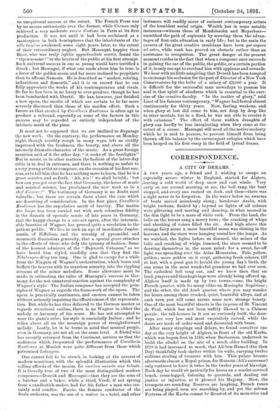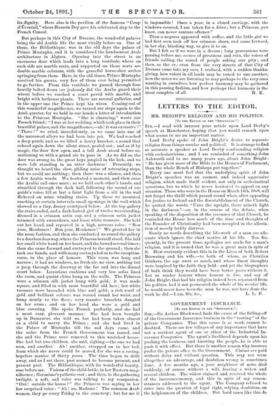CORRESPONDENCE.
A CITY OF DREAMS.
A FEW years ago, a friend and I, wishing to escape an especially severe winter in England, started for Algiers, .leaving a cold world of deep snow and east winds. Very early on our second morning at sea, the bell rang, the boat stopped, and every one rushed on deck, and then—there was a sight never to be forgotten. In the water below us, swarms of boats moved noiselessly along ; handsome Arabs, with bright turbans, flashed by ; beyond us lights of all colours were glittering and moving and dancing, in what seemed in the dim light to be a mass of white rock. From the land, the bells on the horses rang a merry tune ; the cracking of whips and shouting of voices filled the air. And high above this strange fairy,scene a most beautiful moon was shining in the heavens, and the stars were hanging round her like lamps. As we watched, the lights before us dimmed, the noises of the bells and cracking of whips lessened, the stars seemed to be drawing themselves in, the moon paled; for a sweet, far-off light was spreading over the Atlas Mountains. Pale, yellow, golden ; more golden on it crept, gathering fresh colours, till at last, with a great gun to herald the young day's birth, the sun arose in the most wonderful grandeur we had ever seen. The cathedral bell rang out, and we knew then that on land, prayers and thanksgivings were already being offered up. Algiers itself is made up by two towns,—one, the bright French quarter, with its many villas• on Mustapha Superieur ; and the other, the old Arab quarter, where you may wander for hours among those crooked, quiet, beautiful alleys, and at each turn you will come across some new, strange beauty. One of the most beautiful streets is the impasse of St. Vincent de Paul, which has not been unfitly likened to a Chinese puzzle : the tall houses in it are so curiously built, the door- ways are very low and most exquisitely carved, while the doors are made of cedar-wood and decorated with brass.
After many strayings and delays, we found ourselves one day at the very height of Algiers, in front of the old Kaaba, which was begun first in 1516, when Barbarossa undertook to build the citadel on the site of a much older building. In 1818 it had increased so much, that Ali-ben-Hamed (the then Dey) thankfully took shelter within its walls, carrying twelve millions sterling of treasure with him. This palace became afterwards almost a Royal prison, for Hussein (Ali's successor) only ventured to leave it twice in the twelve years of his reign. Each day he would sit patiently for hours on a scarlet-covered bench, cross-legged, listening to quarrels, and dealing out justice or injustice, as it pleased his Majesty. Now, the trumpets are sounding, Zonaves are laughing, French tunes are being played, men are marching by, and yet the solemn Fortress of the Kasha cannot be divested of its memories and its dignity. Here also is the pavilion of the famous "Coup d'Eventail," where Hussein Dey gave his celebrated slap to the French Consul.
But perhaps in this City of Dreams, the wonderful palaces bring the old Arabic life the most vividly before us. One of -these, the Bibliotheque, was in the old days the palace of Prince Mustapha, and it is considered the handsomest Arab -architecture in Algiers. Opening into the street is an enormous door which leads into a long vestibule, where on each side are marble seats, and supported on these seats are -double marble columns, with the graceful horse-shoe arches springing from them. Here, in the old times, Prince Mustapha received his guests, very few of them ever being permitted to go farther. From this vestibule we passed through four heavily bolted doors (so jealously did the Arabs guard their wives) before we reached a court paved with marble, and bright with hothouse plants. There are several galleries, and in the upper one the Prince kept his wives. Coining out of this wonderful magnificence, we turned our steps again to the Arab quarter, for we held in our hands a letter of introduction to the Princess Mustapha. " She is charming," wrote our French friend ; " I was at her wedding, which took place in their beautiful palace, and the magnificence,—ah ! it was excessive !" " There ! " we cried, incredulously, as we came into one of the narrowest alleys we had been into yet. We had reached -a deep porch, and as we lifted a heavy knocker, a sound that .echoed again down the silent street, pealed out ; and as if by magic, the door flew open, and a tall Arab stood before us, motioning us with a grand air to pass in. As we did so, the door was swung to, the great keys jangled in the lock, and we were left standing in an utter darkness ! Presently, we thought we heard the slow, gliding noise of retreating steps, but we could see nothing ; then there was a silence, and then a few Arabic words. We hesitated a moment, and then came the Arabic call once more ; so we held each other's hands, and stumbled through the dark hall, following the sound of our guide's voice, till at last a faint light from a slit in the wall flickered on some winding stairs. Up these we mounted, reaching at certain intervals small openings in the wall which showed us a tiny, dreary courtyard below. At the top gallery the stairs ended, and a dark-haired girl of twelve was standing, dressed in a crimson satin cap, and a crimson satin jacket trimmed with swansdown, and loose white trousers. She held out her hand, and repeated in a high, nervous voice : " Bon jour, Mesdames ! Bon jour, Mesdames ! " We greeted her in the same fashion, and then she conducted us round the gallery to a doorless doorway, where the Princess herself stood. She laid her small white hand on her heart, and she bowed several times; then she came forward and curtseyed to the ground ; then she took our hands, and with many curtseys led us to the reception- room, to the place of honour. This room was long and narrow; it had no windows, no fresh air, no view, nothing but .a peep through the doorway at the far end into the dismal court below. Luxurious cushions and very low sofas lined the room, and quaint china hung on the walls. The Princess wore a crimson silk jacket hung with gold; it was made square, and filled in with most beautiful old lace ; her white trousers were brocaded with blue and gold ; a rich scarf of gold and brilliant colours was wound round her waist, and hung nearly to the floor ; very massive bracelets dangled on her arms ; and on her head she wore a gold and blue covering. She spoke French perfectly, and she had a most easy, pleasant manner. She bad been brought up in Damascus, she told us, but had been taken almost as a child to marry the Prince ; and she had lived in the Palace of Mustapha till the sad days came, and the order from the French Government was issued, and she and. the Prince were removed to this wretched house. She had but two children, she said, sighing,—the one we had seen, and another. Ah ! another, strapped on to her bed, from which she never could be moved, for she was a raving, hopeless maniac of thirty years. The time began to drift away, and as I sat there, past seemed to become present, and present past. The Bibliotheque, with its wonderful beauty, rose before me. Visions of the child-bride, in her Eastern mag- nificence ; Geronimo's pathetic cast ; and then, in the gathering twilight, a soft, sad voice was talking to my companion. " Out ! outside the house P" the Princess was saying in her low surprised voice : "Ah ! no, Madame ! The common Arab women, they go every Friday to the cemetery ; but for me it
is impossible ! Once a year, in a closed carriage, with the windows covered, I am taken for a drive ; but a Princess, you know, can never venture oftener."
Then a negress appeared with coffee, and the little girl we had first seen took off her crimson shoes, and came forward, in her shy, blushing way, to give it to us.
But I felt as if we were in a dream ; long processions were passing before me, scenes of greatness and ruin, the voices of friends calling, the sound of people asking our pity ; and then, as the cry even from the very streets of that City of Dreams came into my ears, I realised, with a sudden thanks- giving, how voices in all lands may be tuned to one another, how the notes we are listening to may perhaps be the very ones wanting in ourselves, how perfect harmony may be gathered in this passing fashion, and bow perhaps that harmony is the



































 Previous page
Previous page